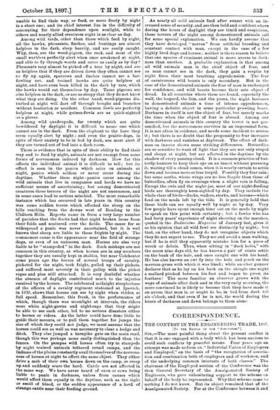CORRESPONDENCE.
THE CONTEST IN THE ENGINEERING TRADE, 1897.
[To THZ EDITOR Or THZ " BIRCTATOZ:1 SIE,—The most painful thing about the present conflict is that it is one engaged with a body which has been anxious to avoid such conflicts by peaceful means. Four years ago an attempt was made to form an "Industrial Union of Employers and Employed," on the basis of "the recognition of associa- tion and combination both of employers and of workmen, and of the underlying common interests of both classes." The chairman of the Employed section of the Conference was the then General Secretary of the Amalgamated Society of Engineers, who gave unhesitating support to the scheme on behalf of the body he represented. Why that scheme came to nothing I do not know. Bat its object remained that of the Amalgamated Society. For at the Conference between it and
the Employers' Federation of Engineering Associations held in April last at the Westminster Palace Hotel (a report of which lies before me) the Society proposed "that there should be set up in the various districts of the federated area local lommittees composed of equal numbers of employers and A.S.E. members, with an independent person from the Board )f Trade to act, if need be, as referee," thus recognising at _mace the rights of employers and employed and of the com- munity at large, in case of their disagreement. "No change likely to lead to dispute" was to be made without "a definite understanding" with such committee, and any new machine which by reason of its construction was "likely to cause dispute through inter or over lapping existing customs," was to be submitted to the committee for decision. The employers rejected the proposal, and refused absolutely to make any counter-proposal, though professing them- selves " at all times willing to meet the members of the Society's Council" to discuss and, if possible, to arrange questions which might arise, and also "willing to appoint members to serve on local boards to arrange general rises or falls of wages" (an immense advance in itself on the ideas of 1852, since the Trade-Union is recognised, and the idea admitted of its having a voice at least as to "general rises and falls of wages ").
Now, I venture to think that in this matter the men were far-sighted, the employers near-sighted. Disputes should always be nipped in the bud, if possible, and the proposal that no change "likely to lead to dispute" should be made without a definite understanding with a joint committee of employers and employed seems to supply just the means of so doing. The question of the working of machinery, which vitally concerns the men, and as to which the employers have no answer but a barren non possums, is one that has been actually settled under the Conciliation Act in the case of the engineers' dispute at Hull (see Labour Gazette for December, 1896, p. 368), and again at Cleckheaton in the case of a firm in the wire-drawing trade (Labour Gazette for May, 1897, p. 134). A very similar case to this, involving, moreover, the rival claims of two Trade-Unions in the Edinburgh boot- making trade, had been equally settled by conciliation under the Act as late as March, 1897 (Labour Gazette for March, 1897). Had the men's proposal of April been fairly met by the employers, the present dispute could not have broken out. The eight-hour day for London, as a change "likely to lead to dispute," could not have been claimed by the men without a "definite understanding" with a joint committee of em- ployers and employed.
Thus, whether or not the Amalgamated Society was justified in asking for an eight-hour day in London, or in calling out all their men when the federated employers locked out 25 per cent. in districts where no such demand had been raised, the primary responsibility for the present crisis rests with the Employers' Federation. Which side will win I cannot forecast. But there is one ignoble weapon which has been used by, or on behalf of, the employers in this contest—not by any means for the first time—to which I must briefly advert, that of applying to Trade-Unions an actuarial test of solvency as if they were ordinary friendly societies, when even a friendly society which depends on the power of levy would not be so treated. The ordinary Friendly Society contract is : "Pay me so much money, and I will ensure you such and such benefits." The Trade-Union contract is : "Pay me whatever I require of you (which under ordinary circumstances will be so much), and I will do my best to maintain and improve your condition, securing you such and such benefits so far as prac- ticable." And when working men see a Society like the Amalgamated Engineers formally shown up as insolvent by actuarieb on every occasion of a great labour contest in which it may be engaged, and yet fulfilling all its obligations for now nearly half a century, the only result is to make them believe that there is no such thing as actuarial science.—I am, Sir, J. M. LUDLOW.











































 Previous page
Previous page